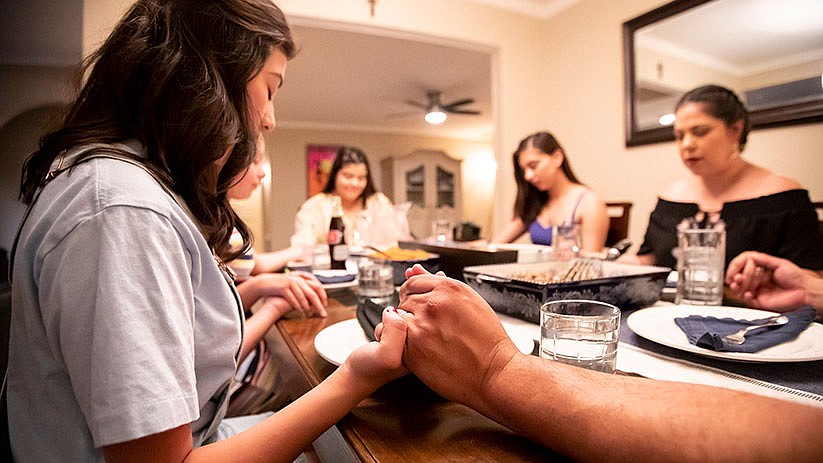Parents pass on religious views more than political views, survey finds
May 17, 2023 at 3:37 p.m.

A new analysis of several Pew Research Center surveys found that most parents pass along both kinds of affiliation to their children.
One survey by the center found that 35% of U.S. parents said it was "extremely or very important" that their children share their religious views, while fewer than half as many – 16% – said the same of their political views. However, the survey found that parents ranked passing on both religious and political views as less important than passing along other values, "such as being honest and ethical, hardworking, and ambitious."
[[In-content Ad]]
Pew then compared that data alongside a 2019 survey of more than 1,800 teens, ages 13 to 17, that researchers interviewed alongside one parent or guardian. That survey found that high majorities of Republican and Democrat parental figures – 81% and 89% respectively – had teens who described themselves either as having the same affiliation or leaning that way.
Similarly high rates in that survey were found for religious views; 82% of Protestant parental figures had teens who also identified as Protestant, while 81% of Catholic parents had Catholic teens. Meanwhile, 86% of religiously unaffiliated parents, which Pew said were the ones who described themselves as "atheist, agnostic or nothing in particular," had teens who expressed similar views. Pew noted the survey sample "was not large enough to estimate transmission rates among parents who belong to non-Christian religious groups, such as Jews and Muslims."
Pew then compared that data to another 2015 survey, which found that most people who were raised in a single religion, either by two parents of the same faith or by a single parent, still identified as an adherent of that religion. Among those raised in Protestant households, 79% were still Protestant, while among those raised Catholic, 62% described themselves as such.
Similarly, among those raised with no religious affiliation, 62% were still unaffiliated.
Among those raised in interfaith households, the numbers dropped, the survey found. Of respondents who were raised by a Protestant parent and another unaffiliated parent, 56% identified as Protestant, while 34% were unaffiliated, 3% were Catholic and 7% belonged to other religions.
In interfaith households with a Catholic parent and the other unaffiliated, 42% said they were unaffiliated in adulthood, while 32% said they were Catholic. Another 20% said they were Protestant, and 5% identified with other religions.
In interfaith households with one Protestant parent and one Catholic, Pew called the outcome "close to a toss-up." When children from these households reached adulthood, 38% identified as Protestant, 29% as Catholic, 26% as unaffiliated and 7% identified with other religions.
Kate Scanlon is a national reporter for OSV News covering Washington. Follow her on Twitter @kgscanlon.
Related Stories
Sunday, December 14, 2025
E-Editions
Events
A new analysis of several Pew Research Center surveys found that most parents pass along both kinds of affiliation to their children.
One survey by the center found that 35% of U.S. parents said it was "extremely or very important" that their children share their religious views, while fewer than half as many – 16% – said the same of their political views. However, the survey found that parents ranked passing on both religious and political views as less important than passing along other values, "such as being honest and ethical, hardworking, and ambitious."
[[In-content Ad]]
Pew then compared that data alongside a 2019 survey of more than 1,800 teens, ages 13 to 17, that researchers interviewed alongside one parent or guardian. That survey found that high majorities of Republican and Democrat parental figures – 81% and 89% respectively – had teens who described themselves either as having the same affiliation or leaning that way.
Similarly high rates in that survey were found for religious views; 82% of Protestant parental figures had teens who also identified as Protestant, while 81% of Catholic parents had Catholic teens. Meanwhile, 86% of religiously unaffiliated parents, which Pew said were the ones who described themselves as "atheist, agnostic or nothing in particular," had teens who expressed similar views. Pew noted the survey sample "was not large enough to estimate transmission rates among parents who belong to non-Christian religious groups, such as Jews and Muslims."
Pew then compared that data to another 2015 survey, which found that most people who were raised in a single religion, either by two parents of the same faith or by a single parent, still identified as an adherent of that religion. Among those raised in Protestant households, 79% were still Protestant, while among those raised Catholic, 62% described themselves as such.
Similarly, among those raised with no religious affiliation, 62% were still unaffiliated.
Among those raised in interfaith households, the numbers dropped, the survey found. Of respondents who were raised by a Protestant parent and another unaffiliated parent, 56% identified as Protestant, while 34% were unaffiliated, 3% were Catholic and 7% belonged to other religions.
In interfaith households with a Catholic parent and the other unaffiliated, 42% said they were unaffiliated in adulthood, while 32% said they were Catholic. Another 20% said they were Protestant, and 5% identified with other religions.
In interfaith households with one Protestant parent and one Catholic, Pew called the outcome "close to a toss-up." When children from these households reached adulthood, 38% identified as Protestant, 29% as Catholic, 26% as unaffiliated and 7% identified with other religions.
Kate Scanlon is a national reporter for OSV News covering Washington. Follow her on Twitter @kgscanlon.










